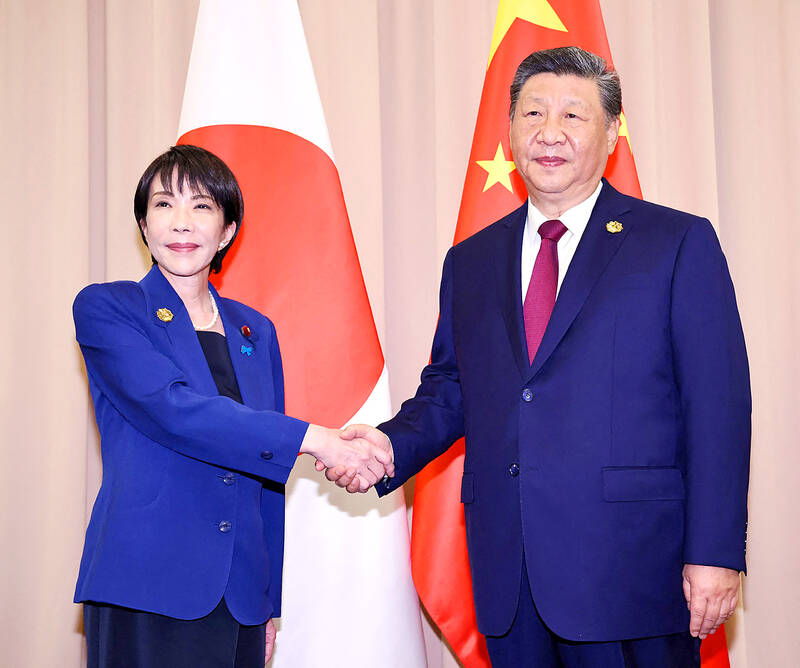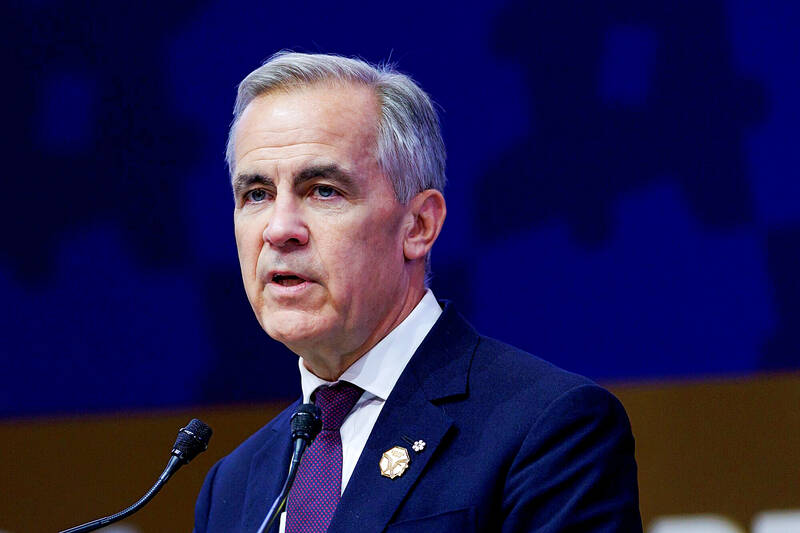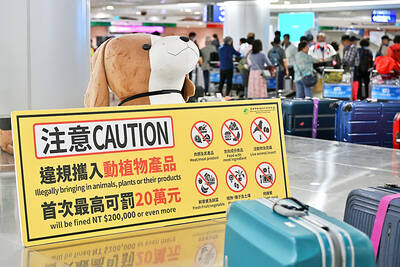Japanese Prime Minister Sanae Takaichi yesterday said she raised "serious concerns" about the South China Sea, Hong Kong and Xinjiang in her first meeting with Chinese President Xi Jinping (習近平).
She said she told Xi at the APEC summit in South Korea that she wanted a “strategic and mutually beneficial relationship between Japan and China,” but also raised a number of thorny issues with him.
“We ... expressed serious concerns regarding actions in the South China Sea, as well as the situations in Hong Kong and the Xinjiang Uighur Autonomous Region,” Takaichi said.

Photo: Jiji Press, AFP
Beijing vehemently denies accusations of human rights abuses against the Uighurs, saying its policies in Xinjiang have eradicated extremism and boosted development, and has sweeping assertions of sovereignty over the South China Sea despite an international ruling in 2016 concluding its claims have no legal basis.
Takaichi said she also raised the issue of the Japanese-administered Senkaku Islands (Diaoyutais, 釣魚台列嶼) in the East China Sea where Japanese and Chinese vessels frequently face off.
She also said she spoke about export controls on items including rare earths that are vital for a wide range of industries, adding that she pressed for the release of Japanese citizens detained in China and requested that the safety of Japanese expatriates in China be ensured.

Photo: Bloomberg
Takaichi is also a strong backer of Taiwan and supports security cooperation with the nation.
“Regarding Taiwan, there was some discussion from the Chinese side,” Takaichi said. “I stated that for the stability and security in this region, maintaining good cross-strait relations is important.”
In related news, China and Canada took a step toward mending the long-fractured ties between their countries yesterday.
Xi and Canadian Prime Minister Mark Carney met during the APEC summit, where they called for improving ties in a pragmatic and constructive manner, both sides said.
“The leaders agreed that their meeting marked a turning point in the bilateral relationship,” a Canadian statement said, while Xi was quoted as saying that relations are showing signs of recovery, thanks to the joint efforts of both sides.
“We are willing to work together with Canada to take this meeting as an opportunity to promote the return of bilateral relations to a healthy, stable and sustainable track as soon as possible,” Xi said.
Relations have been shaken by Canada’s decision last year to levy a 100 percent tariff on electric vehicles (EV) from China, and a 25 percent tariff on steel and aluminum. China has offered to remove its import taxes on some Canadian products if Canada drops the EV tariff.
Ottawa said that both leaders directed their officials to move quickly to resolve trade issues and irritants, and discussed solutions for specific products such as EVs, canola and seafood.
Xi called for expanding “pragmatic” cooperation in areas such as the economy, trade and energy.

UKRAINE, NVIDIA: The US leader said the subject of Russia’s war had come up ‘very strongly,’ while Jenson Huang was hoping that the conversation was good Chinese President Xi Jinping (習近平) and US President Donald Trump had differing takes following their meeting in Busan, South Korea, yesterday. Xi said that the two sides should complete follow-up work as soon as possible to deliver tangible results that would provide “peace of mind” to China, the US and the rest of the world, while Trump hailed the “great success” of the talks. The two discussed trade, including a deal to reduce tariffs slapped on China for its role in the fentanyl trade, as well as cooperation in ending the war in Ukraine, among other issues, but they did not mention

Japanese Prime Minister Sanae Takaichi yesterday lavished US President Donald Trump with praise and vows of a “golden age” of ties on his visit to Tokyo, before inking a deal with Washington aimed at securing critical minerals. Takaichi — Japan’s first female prime minister — pulled out all the stops for Trump in her opening test on the international stage and even announced that she would nominate him for a Nobel Peace Prize, the White House said. Trump has become increasingly focused on the Nobel since his return to power in January and claims to have ended several conflicts around the world,

REASSURANCE: The US said Taiwan’s interests would not be harmed during the talk and that it remains steadfast in its support for the nation, the foreign minister said US President Donald Trump on Friday said he would bring up Taiwan with Chinese President Xi Jinping (習近平) during a meeting on the sidelines of the APEC Summit in South Korea this week. “I will be talking about Taiwan [with Xi],” Trump told reporters before he departed for his trip to Asia, adding that he had “a lot of respect for Taiwan.” “We have a lot to talk about with President Xi, and he has a lot to talk about with us. I think we’ll have a good meeting,” Trump said. Taiwan has long been a contentious issue between the US and China.

Taiwan’s first African swine fever (ASF) case has been confirmed and would soon be reported to the World Organization for Animal Health (WOAH), Minister of Agriculture Chen Junne-jih (陳駿季) yesterday. The Ministry of Agriculture’s Veterinary Research Institute yesterday completed the analysis of samples collected on Tuesday from dead pigs at a hog farm in Taichung and found they were ASF-positive. Animal and Plant Health Inspection Agency Animal Quarantine Division chief Lin Nien-nung (林念農) said the result would be reported to the WOAH and Taiwan’s major trade partners would also be notified, adding that pork exports would be suspended. As of Friday, all samples